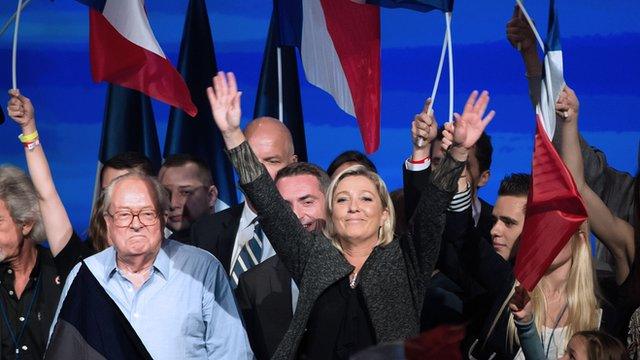The Eurosceptic challenge
- Published
- comments
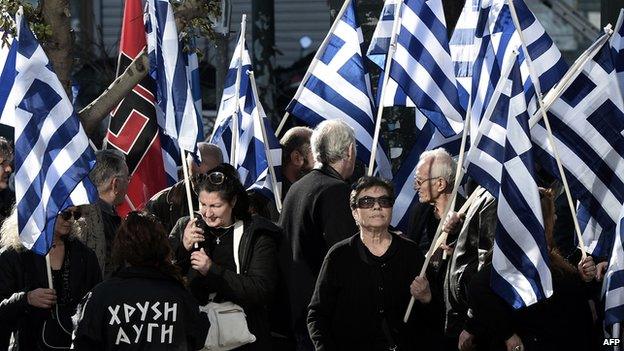
In Greece the Golden Dawn ultra-nationalists have support among voters hit by economic hardship
Unless the polls are very wrong, sometime next weekend Europe will learn that at least a quarter of the seats in the next European Parliament will have gone to anti-establishment and Eurosceptic parties.
The figure could even be closer to 30%. In many places the election has become a referendum on the European project itself.
These parties have very different agendas: some are from the far right, some from the radical left, but they all in their own ways question the EU's prevailing ambition of "ever closer union". Some are wreckers, wanting to tear down the Brussels temple - a fifth column set on undermining the European institutions from the inside.
So how will the European mainstream, the political caste that has set the agenda for almost half a century, deal with these usurpers? How will they deal with their own unpopularity? Some no doubt will choose the easy slap-down and dismiss these upstart parties as a rag-bag army of xenophobes, racists, populists, nationalists, neo-Nazis, and nation-state romanticists. Such labels, of course, conveniently avoid having to engage or argue.
Many will be tempted to argue the case of the majority - a 30% protest vote means that 70% stuck with parties who support further integration. A win is a win. Scoop up the pot.
New alliances?
In the European Parliament the temptation will be for the mainstream parties - the Conservatives (EPP), Socialists (S&D), Liberals (ALDE) and Greens - to form alliances to fend off the Eurosceptic challenge. They may well be more determined than ever to deepen integration. Guy Verhofstadt, one of the candidates for president of the European Commission, hinted at that when he said "this month you will see a kind of victory for the Eurosceptics, but that will hopefully lead to the emergence of a pro-European electorate and eventually to the new leap forward that we need."
The democracies which work best, however, are those where the victor is mindful of the losers and tries to govern in the national interest.
So what is it that fuels support for these protest parties and will the European establishment listen to them?
Firstly, there is the legacy of austerity, the unpopularity of bailouts and the high levels of unemployment.
In Greece the radical left party Syriza argues that austerity has been a catastrophe, leading to social breakdown and the destruction of people's lives. To lose 26% of GDP in five years - that has never happened in modern history. The government in Athens and the officials in Brussels say a corner has been turned, but the Greek people do not feel it.
And recovery in other countries remains elusive. The Italian economy has shrunk more than 8% in six years. The country will be fortunate to record growth of 0.6% this year. Its debt-to-GDP ratio is heading towards 147% in 2015. Merely to prevent that figure rising would require growth of at least 3% a year and a dose of inflation.


Impact of austerity
The truth is that, in many places, Europe has not been fixed.
Unemployment remains stubbornly high and in France it is still rising. Spain's economy has certainly improved, but its jobless numbers remain above 25%. There are some hopeful signs, but the risk remains of a jobless recovery in Europe.
In both northern and southern Europe there is widespread frustration that a very high price has been paid to save the euro, and that has bolstered the ranks of the protest parties.
Secondly, there is globalisation. The official Brussels line is that globalisation makes necessary organisations like the EU. Only by closely integrating can Europe guarantee a seat for itself at the economic top table and so manage the sometimes harsh winds of globalisation. There is some truth in that, but it is an open question who has benefited from the global economy.
Certainly many large corporations have done well and some poorer countries have been lifted up. But many workers in say France and Italy believe it has taken away jobs and destroyed communities.
Marine Le Pen of the National Front (FN) has been clever in pitching her message to former socialist and communist voters who believe that Brussels is on the side of big business and big banks.
In Italy the comedian/politician Beppe Grillo attacks prime ministers who have "become the slaves of financial interests and economic decisions taken elsewhere".
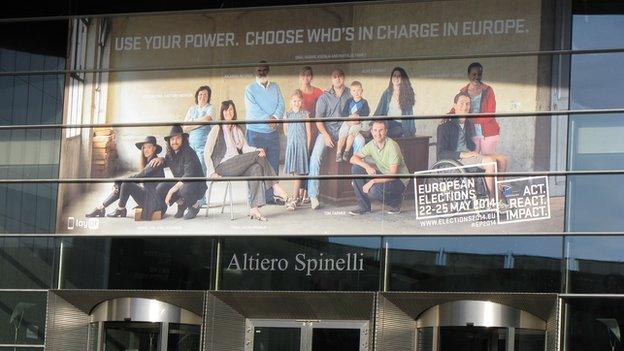
Citizens' choice: The entrance to the European Parliament in Brussels
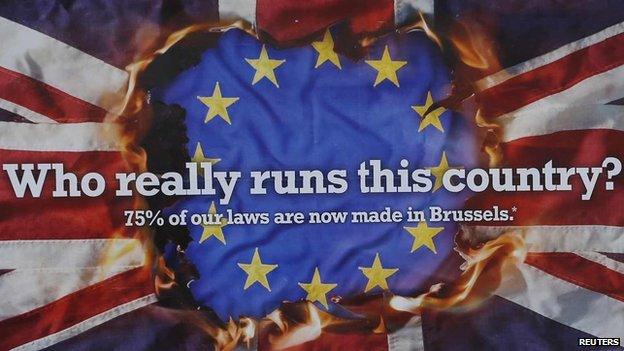
Polls suggest Eurosceptic UKIP could double their number of MEPs in this election
Migrant pressure
Thirdly there is migration. It will always be sensitive when 26 million are out of work. When those intending to vote for UKIP are asked why, immigration is by far the most important reason.
European officials fiercely defend the free movement of people within the EU and insist - rightly - that those trying to reach European shores must be protected. But some politicians argue that at a time of job insecurity there is a case for doing more to make deals with countries like Libya to help reduce the numbers migrating to Europe.
Fourthly there is the crisis of trust in elected leaders, the powerlessness of those in power. It enables Marine Le Pen to say "France does not control anything, not its budget, not its currency, not its frontiers." And even on the left, French ministers like Arnaud Montebourg are talking about the need for "economic patriotism".
Outside the European Parliament are posters urging voters to "Choose who is in charge in Europe". Many in Europe just seem tempted by Nigel Farage's call: "let's topple the establishment".
New reform round?
So what will happen after May 25? History suggests that the protest vote will be ignored - like referendums that delivered a "no" - and that what counts is that the majority voted clearly for parties committed to the project. After all, polls suggest in Greece that still 60% want to stay in the euro. In Spain there is not a Eurosceptic party.
The Brussels gamble will be that, when economic recovery returns, these protest parties will lose their influence and will splinter. In any event they are unlikely to forge meaningful alliances.
The European debate is often characterised as a clash between federalists and sceptics. It ignores the fact that there is a growing body of reformers who believe in the EU but insist it has to change for its own good.
Two days after the vote Europe's heads of government have been summoned to Brussels to discuss "the shape of Europe". Some see this as the start of the opening that the reformers have been waiting for. We shall see.
I will hold a Twitter Q&A on Tuesday 20 May, starting at 1400 GMT (1500 BST), on the future of the euro and Europe's jobs crisis. You can tweet me your questions now - to @BBCGavinHewitt, external - and please use the hashtag #AskBBCGavin. Details are here.
- Published15 May 2014
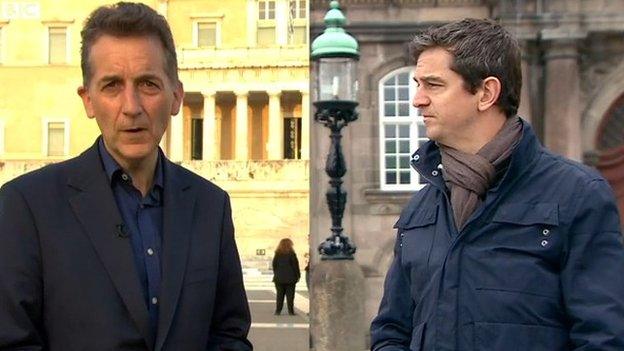
- Published25 February 2014
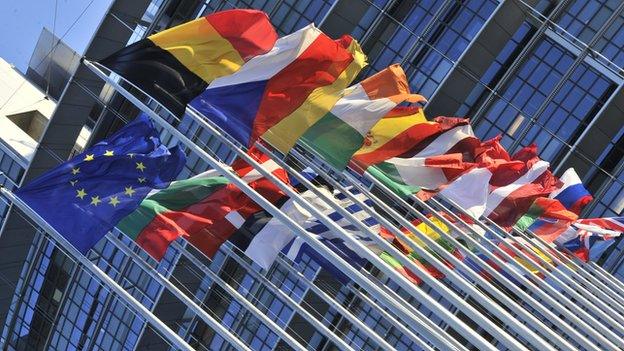
- Published13 November 2013
